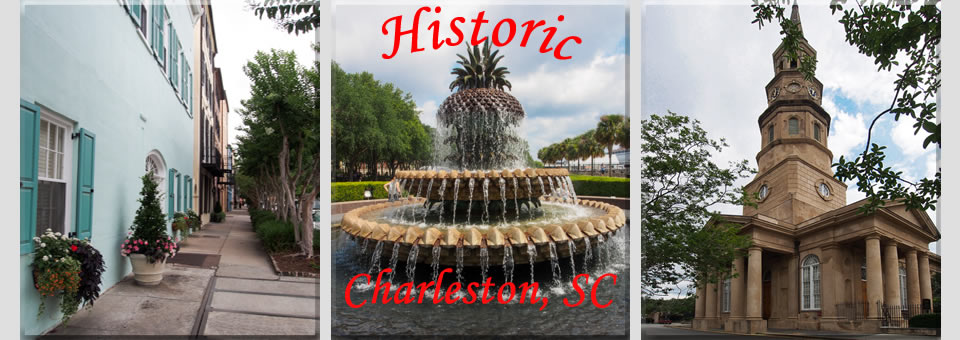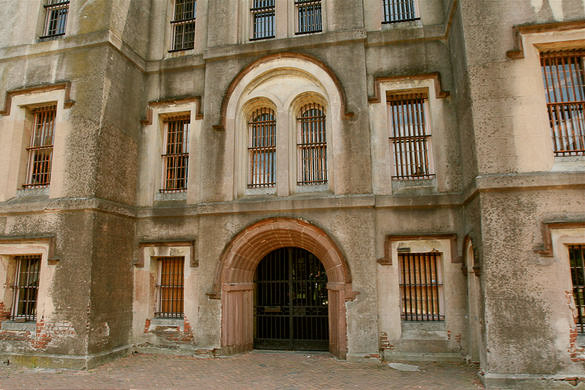Harleston Village - Attractions
- - - - - - - - - - - - - - - - - - - - - - - - - - - - - - -
Map of Harleston Village

Harleston Village is one of Charleston's earliest and largest neighborhood. It was established in the 18 century. Located in Harleston Village is the College of Charleston which is one of the oldest Universities in the country. You will also find the Wentworth Mansion, a grand historic mansion which dates back to the 1880's.
Today Harleston Village is one of the most diverse and lively neighborhoods in Downtown Charleston. Colonial Lake and Moultrie Park are located in Harleston Village
- - - - - - - - - - - - - - - - - - - - - - - - - - - - - - -
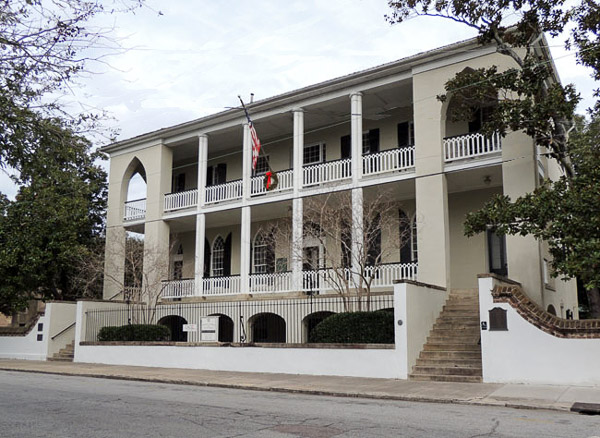 Old Marine Hospital, The
Old Marine Hospital, The Old Marine Hospital, The
Old Marine Hospital, The
 Old Marine Hospital, The
Old Marine Hospital, The Old Marine Hospital, The
Old Marine Hospital, The
Charleston, SC 29401
Not open to the public
The Old Marine Hospital is one of only eight remaining from a group of around 30 marine hospitals built before the Civil War. The Old Marine Hospital construction started in 1831 and was completed in 1833. It was built for sick sailors and other transient persons.
The Old Marine Hospital was designed with subtle Gothic features that included pointed arches, windows and clustered columns. The porch railings were designed to resemble the tracery around Gothic stained glass window.
After the Civil War, the Episcopal Church used the building as a free school for black children. From 1895-1939 the structure served as the Jenkins Orphanage. In 1939 the Housing Authority of Charleston purchased the building for administrative offices, which are still used today.
- - - - - - - - - - - - - - - - - - - - - - - - - - - - - - -
 Old Jail, The
Old Jail, The
 Old Jail, The
Old Jail, The
Charleston, SC 29401
Hours: Tours are available by appointment. Please call 843-577-5245 for further information.
The Old Jail is located on a four-acre parcel. The Old Jail was constructed in 1802 and served as the Charleston County Jail until 1939. The Old Jail consisted of four stories, topped with a two-story octagonal tower. In 1855 alterations were made to the building which included a rear octagonal wing, plus expansions to the main building and Romanesque Revival details. The 1886 earthquake badly damaged the tower and top story of the main building and these were later removed.
Many notorious inmates served time at the Old Jail. John and Lavinia Fisher and their gang convicted of robbery and murder were held at the jail from 1819-1820. There were pirates, Union soldiers and four white men suspected of being involved in the aborted 1822 slave revolt also spent time in the jail.
Today the Old Jail is occupied by the American college of the Building Arts.
- - - - - - - - - - - - - - - - - - - - - - - - - - - - - - -
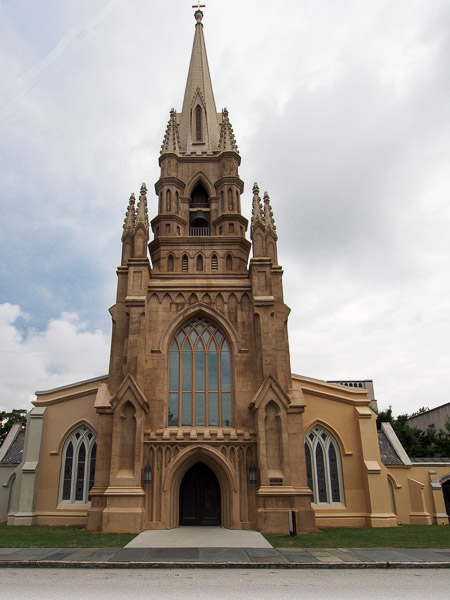
Grace Episcopal Church
 Grace Episcopal Church
Grace Episcopal Church
 Grace Episcopal Church
Grace Episcopal Church Grace Episcopal Church
Grace Episcopal Church
Charleston, SC 29401
Hours:
Monday - Thursday 9:00a - 5:00p
Friday 9:00a - 4:00p
Grace Episcopal Church was built in 1846 and is a perfect example of Gothic Revival architecture in the city. The Gothic sanctuary is rich in religious symbolism. Centerpieces are the altar window, which displays the sacraments of the church, and the great entrance window, which depicts the Great Commission by which Christ sends his followers into the world to spread the Gospel. The clerestory windows record twelve major events in the life of Christ and relate them to institutions in today's world.
- - - - - - - - - - - - - - - - - - - - - - - - - - - - - - -
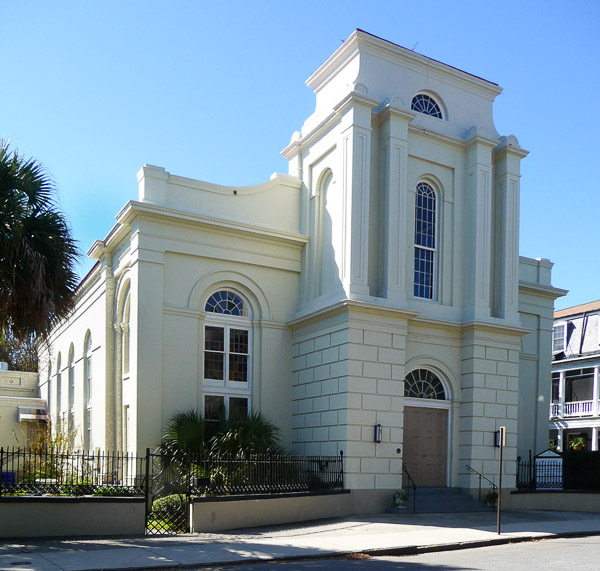 Mt. Zion A.M.E. Church
Mt. Zion A.M.E. Church Mt. Zion A.M.E. Church
Mt. Zion A.M.E. Church
 Mt. Zion A.M.E. Church
Mt. Zion A.M.E. Church Mt. Zion A.M.E. Church
Mt. Zion A.M.E. Church
Charleston, SC 29401
Hours: Sanctuary is open for prayer and meditation
Monday - Wednesday and Friday: 11:30a to 1:30p
Mount Zion African Methodist Episcopal Church was built in 1847-48 as the Glebe Street Presbyterian Church. In 1881 the church was purchased by a group from Emanuel African Methodist Episcopal Church. They organized a new congregation which became Mount Zion African Methodist Episcopal Church. Mt. Zion A.M.E. Church became the first brick church building in Charleston that African Americans owned.
- - - - - - - - - - - - - - - - - - - - - - - - - - - - - - -
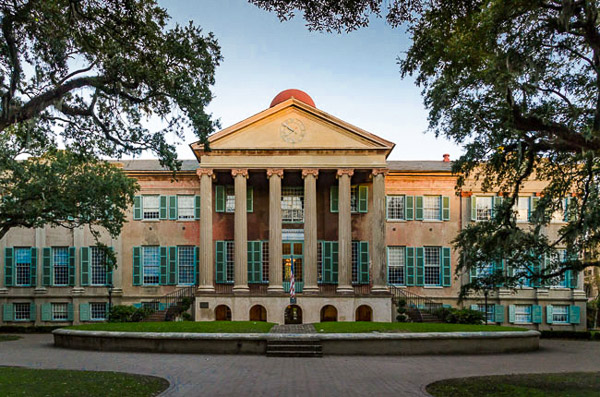 College of Charleston
College of Charleston College of Charleston
College of Charleston
 College of Charleston
College of Charleston College of Charleston
College of Charleston
Charleston, SC 29401
Hours: Open to the public.
Tours:
Monday - Friday: 10:00a, 12:00p and 2:00p during the school year, and at 10:00a during the summer.
The College of Charleston is the oldest municipal college in Charleston, SC, the 13th oldest institution of higher learning in the United States, and the oldest municipal college in the country. Founded in 1770, and chartered in 1785. The College possesses additional historical significance as the oldest institute of higher learning in South Carolina, and the 13th oldest in the country. The center of the small campus contains its core of historic mid-19th- century buildings, the Main Building, the Library and the Gate Lodge. The founders of the college include three signers of the Declaration of Independence, and three fathers of the United States Constitution.
- - - - - - - - - - - - - - - - - - - - - - - - - - - - - - -
 William Blacklock House
William Blacklock House William Blacklock House
William Blacklock House
 William Blacklock House
William Blacklock House William Blacklock House
William Blacklock House
Charleston, SC 29401
William Blacklock was a member of the Branch Bank of the U.S. in Charleston. He built his house around the 1800s. His house is an excellent example of the Adam style.
The house is a three-story brick building that is set back from the sidewalk just the width of the matched double stairs with wrought iron railing that rise over the first floor entry. Two marble columns support the platform to which the stairs ascend. The house has a double door entry way placed in a frame of intricately designed sidelights and topped by one of the city’s handsomest fanlights. The door is set in a wide brick arch that is flanked by narrower window arches to either side.
The basement door is concealed under the double stairs by a pair of columns in a Palladian spacing. Marble keystones have been inserted in between the red brick headers which form arches above the windows of the facade. Overlooking the rear garden are two outbuildings with Gothic windows. The house has an unusually large lot and is one of the largest residences in the city.
Today, the house is owned by the College of Charleston which uses it for social events in addition to housing the Alumni Relations Office.
- - - - - - - - - - - - - - - - - - - - - - - - - - - - - - -
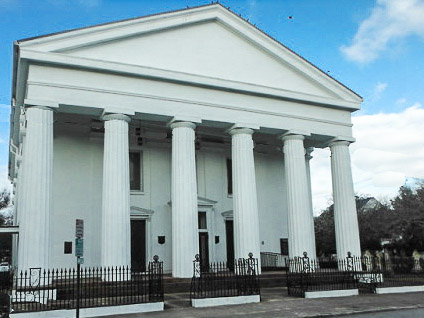 Bethel United Methodist Church
Bethel United Methodist Church Bethel United Methodist Church
Bethel United Methodist Church
 Bethel United Methodist Church
Bethel United Methodist Church Bethel United Methodist Church
Bethel United Methodist Church
Charleston, SC
Hours: Open to the public
Monday - Thursday: 9:00a - 4:30p
Friday: 9:00a - 2:00p
The first Methodist congregation in Charleston purchased this parcel of land in 1795 and the Old Bethel United Methodist Church building was erected here in 1797. Bethel Methodist Church is an exceptional example of Greek Doric Temple architecture common to antebellum.
A division between black members and white members of the congregation developed in the 1830s. The original church was moved to the western portion of the lot in 1852 for the black Methodists and work soon began at the original site for the second Methodist Church for the white Methodists. The new church was completed around 1854.
Bethel was the only Methodist church in Charleston which remained open during the Civil War, and it survived the earthquake of 1886 intact. Although there have been interior alterations, the exterior has been well-preserved.
- - - - - - - - - - - - - - - - - - - - - - - - - - - - - - -
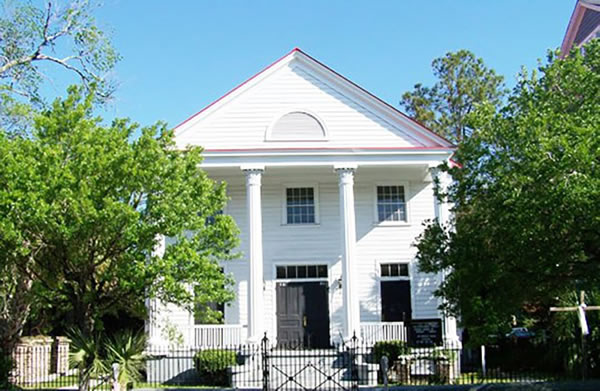 Old Bethel United Methodist Church
Old Bethel United Methodist Church Old Bethel United Methodist Church
Old Bethel United Methodist Church
 Old Bethel United Methodist Church
Old Bethel United Methodist Church Old Bethel United Methodist Church
Old Bethel United Methodist Church
Charleston, SC 29401
Hours:
Monday - Thursday 9:00a - 4:00p
Old Bethel United Methodist Church is the third oldest church building surviving in Charleston. Construction of the Bethel United Methodist Church began in 1797 and was completed in 1807. The pressed metal ceiling and Victorian era furnishing of Old Bethel date to the end of the 19th century.
Membership in the congregation of Old Bethel was open to both free blacks and slaves. However, in 1834 a schism developed over whether blacks were to be restricted to sitting in the galleries. By 1840 the black members seceded to form their own congregation.
The church currently serves a black congregation, which includes descendants of the 1880 congregation.
Old Bethel United Methodist Church is located at 222 Calhoun St. The building is open to the public. Call 843-722-3470 for further information.
- - - - - - - - - - - - - - - - - - - - - - - - - - - - - - -
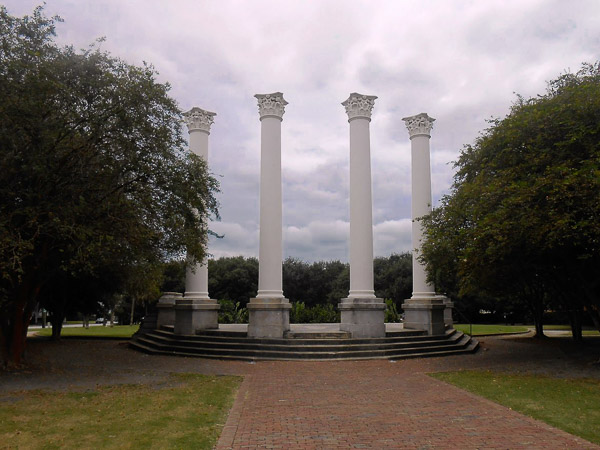 Cannon Park
Cannon Park Cannon Park
Cannon Park
 Cannon Park
Cannon Park Cannon Park
Cannon Park
Charleston, SC 29401
Cannon Park is a 2.7 acre public park located in peninsular Charleston. It is located in Harleston Village at the corner of Ashley Avenue and Bennett Street.
This property was given to the City of Charleston in the early 1800s for a public park. Over the years the park land was used for many different purposes such as a convention hall, theater, City Hospital. In January 1907 the city agreed to leased the hall to the College of Charleston to house its museum. In October 1980, a fire destroyed the hall leaving only its four grand columns which were at the entrance to the museum. Fortunately the museum had already moved to it new location on Meeting Street.
In 1981, the city proposed a redevelopment of Cannon Park. The proposal was to retain the four grand columns as the focal point and establish the landscaping around them using palm trees and oaks.
The park today has a playground and walking paths. While the park is unfenced, it does allow unleashed dogs.
- - - - - - - - - - - - - - - - - - - - - - - - - - - - - - -
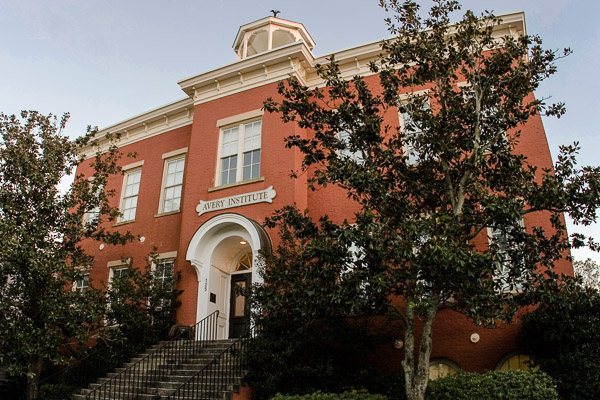 Avery Research Center
Avery Research Center Avery Research Center
Avery Research Center
 Avery Research Center
Avery Research Center Avery Research Center
Avery Research Center
Charleston, SC 29424
Hours: Open for Research
Monday - Friday:12:00p to 5:00p
The Avery Normal Institute was Charleston's first free secondary school for African Americans. The school was organized by Reverend R. L. Cardoza at the end of the Civil War in 1865. The estate of Reverend Charles Avery of Pittsburg donated a grant of $10,000 for the school which is named after Mr. Avery. Other financial assistance was received from the Freedman's Bureau, local merchants, and the American Missionary Association of New York City. The construction of the school began in 1867 and was completed in 1868. The school was designed in the Italianate style with arched entry, cupola, and piazzas running the length of the building.
The School operated as a private institution serving Charleston's most prominent free black families. In 1947, the institute became a public city school.
Currently known as the Avery Research Center for African American History and Culture, the center is part of the College of Charleston and operates as a museum and archives for African American history and culture.
- - - - - - - - - - - - - - - - - - - - - - - - - - - - - - -
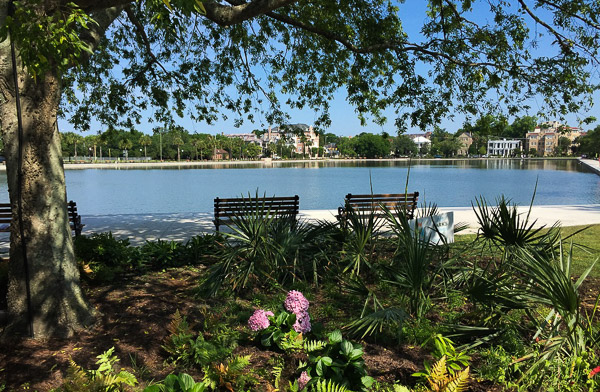 Colonial Lake
Colonial Lake Colonial Lake
Colonial Lake
 Colonial Lake
Colonial Lake Colonial Lake
Colonial Lake
Charleston, SC 29401
Colonial Lake is a tidal pond in Charleston with wide walkways around it. The tidal lake changes with the daily tide changes. It acquired the name Colonial Lake in 1881, in honor of the "Colonial Commons" established in 1768.
The park around the lake was developed in the 1880s. The current configuration of a lake within concrete embankments with a wide promenade on all four sides was largely completed by 1885. Improvements to the park have been consistent over the years.
Colonial Lake has become one of the most popular parks for afternoon strolls. Park benches give a resting point for quiet conversations. During the holidays Charleston's most talked about Christmas trees are lit for all to see in the middle of the lake.
